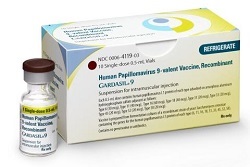All 69 of the United States' National Cancer Institute-designated centers have joined together to issue a statement urging an increase in HPV vaccinations, declaring the vaccines "tragically underused" and calling low uptake a "public health threat."
According to 2015 CDC numbers, just 40% of girls and 21% of boys in the U.S. have received the vaccines, offered by Merck ($MRK) and GlaxoSmithKline ($GSK). Factors hindering uptake include antivaccine campaigns, safety concerns, a sex stigma and pediatricians' reluctance to discuss the jabs.
The centers called the vaccination rates "alarming" because of the vaccines' ability to prevent HPV infection and several associated deadly cancers. A HHS 2020 initiative has set HPV vaccination goals for both boys and girls at 80%.
 Last month, a poll of nearly 600 doctors found that many pediatricians and family practitioners aren't strongly recommending the vaccines to preteens and parents. That study found that 60% of pediatricians and 59% of family practitioners strongly recommended the vaccines for girls aged 11 to 12 years old, while 52% of pediatricians and 41% of family practitioners did so for boys. And before that, a Journal of Adolescent Health study found that parents may be influenced by incomplete or inaccurate web info on HPV vaccination.
Last month, a poll of nearly 600 doctors found that many pediatricians and family practitioners aren't strongly recommending the vaccines to preteens and parents. That study found that 60% of pediatricians and 59% of family practitioners strongly recommended the vaccines for girls aged 11 to 12 years old, while 52% of pediatricians and 41% of family practitioners did so for boys. And before that, a Journal of Adolescent Health study found that parents may be influenced by incomplete or inaccurate web info on HPV vaccination.
Once anticipated to bring in between $4 billion and $10 billion by optimistic analysts, the vaccine class has struggled to meet some expectations since being introduced in 2006. In 2015, Merck's Gardasil and Gardasil 9 HPV vaccine franchise brought in $1.9 billion, a 10% growth versus 2014. GlaxoSmithKline's Cervarix brought in £88 million ($128 million) in sales for the year, a 20% decrease from 2014.
The cancer centers said countries such as Australia, the United Kingdom and Rwanda have demonstrated high vaccination rates are possible, as each of those countries above a 75% vaccination rate.
- here's the letter (PDF)